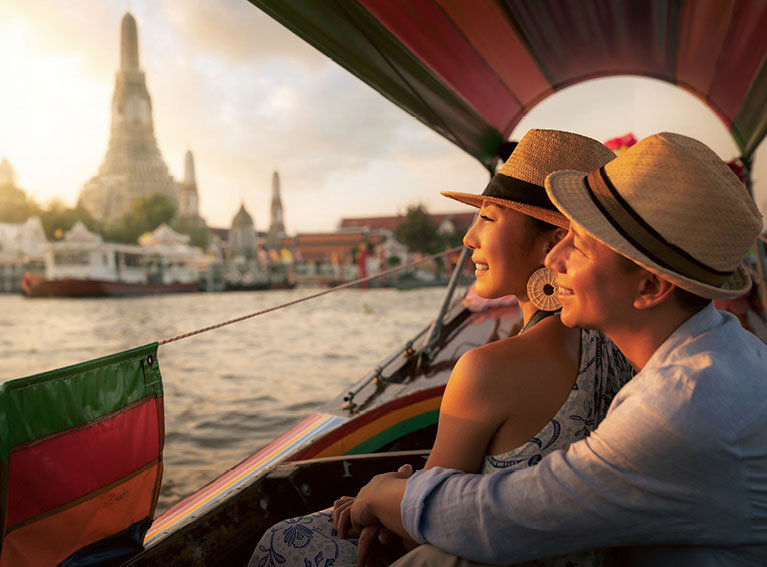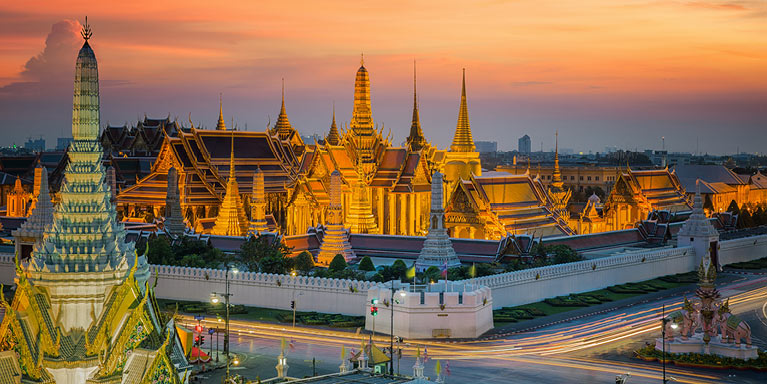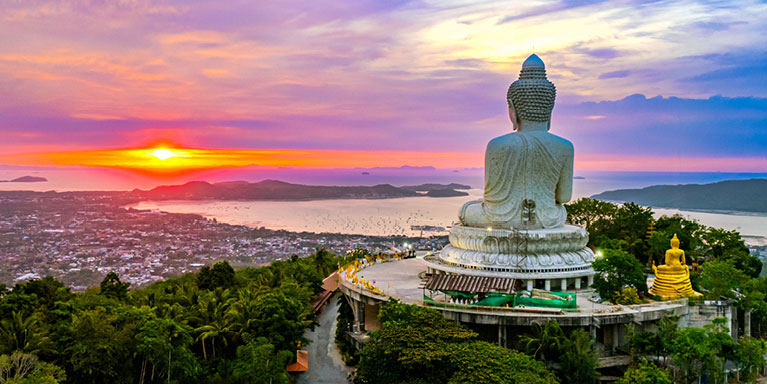
A guide to Thailand
Our expert view on expat life in a land of contrasts

Thailand is a land of contrasts – from the hustle and bustle of the capital to the idyllic islands – and its unique culture attracts expats from around the world.
It offers a host of new experiences, spicy culinary delights and excellent value for money, so even if salaries aren’t as high as at home they’ll stretch much further.
In this guide, we’ll look at the things that are good to know to help you settle quickly into your new life. And, if you’re thinking of moving abroad, we’ll be by your side as you embark on your latest adventure.
- Population: Just under 70 million
- Currency: Thai baht (THB)
- Capital: Bangkok
- Biggest city: Bangkok
- Main language: Thai, although English is widely understood
- Main religion: Buddhism, with a small percentage of Islam and Christianity
- Political system: Constitutional monarchy
- International dialling code: +66
- Emergency services: 191 (general), 1155 (tourist police), 1554 (ambulance), 199 (fire)
- Driving: On the left, like the UK
-
Careers
The Thai economy has continued to grow and attract expats from all over the world. However, if you want to work in Thailand, you’ll need a valid work permit. These are only issued to people who have secured a job on the current ‘permitted’ list, which should be available from your nearest Thai embassy or consulate. Thai companies are legally obliged to employ four Thai nationals for each expat, which may limit your career options.
English teachers and people in the automotive, finance, agriculture, electronics and tourism industries are currently in demand. Salaries for skilled expats are higher than those back home, but lower for unskilled work.
As you’d expect, Bangkok is the bustling centre of business and foreign investors are welcomed with open arms. Business culture is usually quite reserved, and working relationships are based on formality and mutual respect. Thailand is a hierarchical society and it’s vital to be polite and respectful to your superiors in age and rank.
Colleagues will judge your behaviour as much as your level of competence and expertise, so dress formally and always be courteous and humble. Lateness is not tolerated, even with a valid reason, as meetings are arranged weeks in advance and appointments kept to the minute.
Thai is the official business language, but English is widely spoken, particularly in Bangkok. You may need an interpreter in some circumstances. Official business hours are usually from 9.00am to 5.00pm, Monday to Friday, with an hour for lunch.
Handshakes are acceptable, but the traditional Thai greeting is the wai. This is where you press your palms together at chest height, fingers extended upwards, and give a slight bow. It’s usually initiated by a person of lower status to a person of higher status and shouldn’t be used with secretaries and clerks.
Exchanging business cards is important and usually have Thai on one side and English on the other. Use your right hand to present a card, with the appropriate side facing up. Gifts aren’t expected, but small tokens can help to build good relationships. Don’t open gifts in front of the giver unless invited to do so.
Education
State schools in Thailand offer 12 years of basic education, mandatory from the age of 6 to 15 years old. Standards vary and many expats choose to send their children to an international school, where classes are usually taught in their home language. Fees are high and pupils usually have to study the Thai language and culture as part of the curriculum.
If you can negotiate an education allowance as part of your employment contract it would be a worthwhile benefit. School managers and principals must be Thai nationals, but there’s usually an expat head teacher as well.
There are also fee-paying independent schools, run by charitable organisations and the Catholic Church, which are greatly valued in Thailand.
Homeschooling is legal. Thailand's constitution and education law recognises alternative education and considers the family to be an educational institution. However, you need to apply to the government for permission.
-
Moving money
Putting the right banking arrangements in place is vital for expats around the world. You want to be able to access and transfer money easily, and with a bank you can trust to comply with international regulations. Most people have two banks – one in their home country and one local to where they’re living. But, if your bank has a global network, you may be able to set up an account ahead of your arrival, which gives you time to assess the financial market.
It’s important to understand how foreign exchange works and how fluctuating exchange rates can affect you. When you’re juggling finances in multiple currencies, remember that the currency markets can move quickly and make a big difference to the value of your money.
To help you reduce the risk of fluctuating currency, you could choose a foreign exchange that lets you fix an exchange rate for a fixed period. Then you’ll know exactly how much you need to convert, whatever happens in the market.
Budgeting
When you’re looking to move to a new country, you need to consider how a change in the cost of living could affect your finances. If you’re moving with your job, sometimes your employer may help with expenses, such as accommodation or school fees. Remember to account for setup costs, such as buying furniture and sorting insurance, when you’re thinking about your budget.
Costs
Some of our offshore accounts have a monthly fee, such as the International Current Account, whereas others, like the Premier International Account, don’t. Both offer fee free International Payments (correspondent and recipient bank charges may apply) and 24/7 worldwide access. Plus, the Premier also includes worldwide travel insurance for you and your family, which is underwritten by AWP P&C SA and administered by Allianz Assistance, which is a trading name of AWP Assistance UK Ltd. Eligibility criteria, terms and conditions apply.
Financial planning
While it’s going to be a busy time, it’s also worth setting some time aside to review your financial plans, such as whether you want to open any offshore accounts. They offer the convenience of keeping your money in one place so you can stay with the same bank no matter where life takes you.
Your expat status could give you new opportunities that weren’t available to you at home. However, tax rules differ from country to country, so if you’re unsure about your personal tax obligations, you should seek professional advice.
Lloyds Bank International Private Banking is by your side every step of the journey as you start your new life abroad. We offer international knowledge, experience and dedicated expert support to help meet all your financial needs. From savings to international payments and transfers, we can help you navigate the complex world of wealth management away from home.
Security
Offshore accounts are not protected by the Financial Services Compensation Scheme (FSCS), which protects savings up to £85,000 with authorised UK banks and building societies.
However, our accounts are covered by other schemes. The Jersey Bank Depositor Compensation Scheme, the Isle of Man Depositors’ Compensation Scheme and the Guernsey Banking Deposit Compensation Scheme offer protection for eligible deposits of up to £50,000.
Tax
All resident and non-resident individuals earning income from sources in Thailand are subject to personal income tax (PIT). A Thai resident is also subject to PIT on self-employment and business income from sources overseas. Individuals are considered resident if they reside in Thailand for 180 days or more during a calendar year.
Taxable income consists of assessable income, less deductible expenses and allowances.
Employment income – unless expressly exempt by law, all benefits derived from employment are assessable. These include salaries, allowances, bonuses, bounties, gratuities, directors’ fees, pensions, accommodation and income tax paid by an employer on behalf of an employee.
Self-employment and business income – taxable income consists of assessable income, unless exempt by law, less deductible expenses and allowances.
Investment income – interest, dividends and other investment income are subject to PIT. A tax credit is granted for dividend income received by an individual domiciled in Thailand from locally incorporated companies.
Taxation of employer-provided stock options – employees are subject to tax on the benefit derived from shares provided free or at a favourable price by the employer. The taxable benefit is the difference between the price paid by the employee and the market value of the shares.
Capital gains tax – gains derived from sales of shares are generally subject to PIT, but gains derived from sales of securities listed on the Stock Exchange of Thailand are exempt from tax. Gains derived from sales of real property are subject to PIT. A standard allowance is deductible, depending on the number of years of ownership. This tax also applies to gains derived from sales of real estate used for trade or business.
Under the Inheritance Tax Act, inheritances received are taxable only on the accumulated value of over 100 million THB per benefactor. This is charged at a rate of 5% in the case of descendant or parents or 10% in all other cases. The tax filing must be completed within 150 days from the date of receipt, otherwise penalties and surcharges are applied.
Gifts are generally taxed at a flat rate of 5%, although gifts received from a legitimate parent, child or spouse (up to 20 million THB per year) or on occasions in accordance with custom and tradition (up to 10 million THB per year) are exempt.
The social security contribution rate is 5% on a capped payment of 15,000 THB per month. As a result, the contribution is capped at 750 THB per month and 9,000 THB per year.
Some self-employed individuals, including certain professionals and those engaged in the rental of property, must make an interim income tax payment in September. Self-assessed income tax must be paid on the filing date of 31 March.
Thailand has entered into double tax treaties with 61 countries.
The tax authority is the Revenue Department, and the tax year runs from 1 January to 31 December. See www.rd.go.th for further information.
Accommodation
Rental accommodation is plentiful and there’s something to suit every budget.
Whether you’re looking for a bamboo beach hut or an apartment in the city, you’ll be spoilt for choice. Many expats in Bangkok opt for serviced apartments in the business district, which makes it easy for catching public transport and enjoying the nightlife. Families tend to prefer suburban townhouses near an international school. The island villas or traditional homes in the north are generally favoured by retirees for their peace and quiet.
Most rental properties come furnished. Ask for an inventory to be signed before you move in, whereby you agree on what’s included and note any existing damage. Normally, you’ll have to pay a deposit of two to three months’ rent and sign a contract for a set period, most commonly 6–12 months.
You’ll need your passport, a copy of your work permit and proof of income to apply for a long-term rental. On top of your monthly rent, you’ll still need to pay for your phone line, water and electricity, so make sure to budget extra for that.
The capital, Bangkok, is a lively modern city with excellent transport links, numerous shopping malls, vibrant nightlife, supermarkets, hospitals and international schools. Chiang Mai, in the north, is more affordable, has excellent internet connectivity, friendly locals and plenty of entertainment on offer, including live music, markets and festivals.
The southern island of Phuket is famous for its stunning beaches, luxury resorts, nightlife and large expat community. It’s well connected to the rest of the world, with an international airport that offers direct flights to many destinations across Asia and Europe. Pattaya is another popular coastal city on the Eastern Gulf of Thailand, cheaper than Phuket and has everything you need – fast internet, hospitals, international schools, entertainment, shopping and sports.
Hua Hin is a relaxed seaside town about 200 kilometres south of Bangkok, with a good mix of modern conveniences, spectacular amusement parks and traditional Thai culture. Koh Samui is a laid-back tropical island boasting beautiful beaches and lush terrain with a reasonable cost of living. Kanchanaburi is a small town just outside of Bangkok with less traffic, clean air, mountains and forests on your doorstep. Chiang Rai, in the north of the country, is a friendly, affordable city beloved of digital nomads.
Krabi is a province in southern Thailand known for its picturesque landscapes, limestone cliffs, beautiful beaches and stunning islands. As it’s not a very touristy town, it’s a very affordable place to live with all the essential amenities. Khon Kaen is a small city becoming increasingly popular with expats, as many residents speak English thanks to several universities and many international students.
Arts
The origins of Thai art were influenced by Buddhist and Indian art, and the indigenous civilisations of the Mon. Traditional Thai sculpture almost exclusively depicts images of the Buddha, and the paintings usually consist of book illustrations or the ornamentation of buildings such as palaces and temples.
During the Sukothai and Ayutthaya period, a unique style developed and was further influenced by the other Asian styles, mostly by Sri Lankan and Chinese. The royal courts provided patronage, erecting temples and other religious shrines to commemorate important events.
Thai literature has had a long history. Oral and written works existed before the establishment of the Sukhothai Kingdom, when most literary works were written in simple prose with certain alliteration schemes. During the Ayutthaya Kingdom, new poetic forms were created, with different rhyme schemes and in the 18th century Rattanakosin period numerous works dealt with war and military strategy.
Thai classical dance Khon and Lakhon nai were established exclusively for entertaining the courts, along with classical music, around 800 years ago. This later evolved into regional varieties for common folk.
Thai cinema grew in the early 2000s and developed a cult following, particularly in the horror genre or featuring Thai martial arts, such as Muay Thai.
Culture
Thai people are friendly, with a strong sense of hospitality and generosity, and welcome farangs (foreigners). They respect social hierarchy, whether that’s the elderly or superiors (in terms of position, certain professions and monks) and show deference towards ancestors as part of Thai spiritual practice. The elders traditionally rule family decisions or ceremonies and older siblings have duties to younger ones. Men and women’s names are usually preceded by the title ‘Khun’, followed by their first name rather than surname.
Taboos in Thai culture include touching someone's head or pointing with the feet, as the head is considered the most sacred and the foot the lowest part of the body.
You can get by with English in the bigger cities where it’s taught as a second language, but locals will appreciate any effort you make to speak their language, even just a few basic phrases such as ‘Sawasdee’ (hello) and ‘Kawp Koon’ (thank you).
Food
Thai cuisine has now become popular worldwide and you certainly won’t be disappointed when you’re living there. It traditionally blends five fundamental tastes: sweet, spicy, sour, bitter and salty. Common ingredients include garlic, coconut milk, lemongrass, kaffir lime, galangal, turmeric and coriander, and the staple food is jasmine rice. Each region has its own specialities: kaeng khiao wan (green curry) in the central region, som tam (green papaya salad) and khao soi in the north, and massaman curry in the south. Bangkok is often referred to as ‘the street food capital of the world’.
Health
The standard of facilities in Thailand varies, especially in the more rural areas. Most expats take out private medical care, which is more affordable than you might think and generally high quality (emergency and special procedures are often extra and expensive). The Ministry of Public Health oversees more than 1,000 hospitals with over 300 private hospitals. Many doctors, specialists and pharmacists speak English.
Pharmacies, identified by a white sign emblazoned with a green cross, are easy to find in most towns and cities. They open daily, with limited hours on a Sunday, and you can get a wide range of medications without a prescription.
You should have all the relevant vaccinations before you move and keep them up to date, and only drink bottled water. For emergencies, it’s best to call the tourist police or the ambulance service at your nearest private hospital rather than trying to find an English-speaking operator at the public rescue service.
Private health insurance in 2024 started at around 20,000 THB (440 GBP or 565 USD) per year for a basic plan up to 100,000 THB (2,196 GBP or 2,823 USD) a year for comprehensive family cover. This is based on coverage, age, and any pre-existing conditions.
Pets
Living animals’ are treated as restricted goods; therefore, an import permit from the Department of Livestock Development is needed when bringing pets into Thailand. All pets must be microchipped, have up-to-date vaccination records and a pet passport. You must have an animal health certificate, approved by both your veterinarian and a government official from the country of export. Quarantine isn’t mandatory if the pet is showing no signs of illness and all the official paperwork is in order.
Restricted items
Items that are banned include arms and ammunition, drugs, pornographic literature, short-wave radios and inflammable goods. There are also restrictions on alcohol, food and plants.
Shipping
If you’re shipping goods to Thailand, it’s best to use a reputable company, take out a decent level of insurance and pay a bit extra for that added peace of mind. You might not need to take all your belongings as most rented accommodation in Thailand comes furnished and household goods aren’t overly expensive.
If you do ship your household goods, you’re allowed to bring one sea shipment and one air shipment into the country duty free within six months of your arrival if the goods have been used for at least six months beforehand. You can’t import household goods earlier than a month before you move.
Transport
Thailand has a good public transport system. Buses are efficient, extensive and cheap. Rail travel is more limited unless you live in Bangkok, where there are four main routes to all parts of the country. First-class carriages are comfortable, air-conditioned and reasonably good value if you’re embarking on long journeys.
There are also four rapid transit rail systems in Bangkok: the BTS Skytrain, MRT, SRT Red Lines and the Airport Rail Link. The metro system (MRT) has two lines – the blue and purple – and more planned. Trains are frequent and run on time. They also connect to the BTS Skytrain, an elevated train that serves around 30 stations in the city.
Taxi services are fairly cheap, comfortable and very convenient. A red light indicates they’re available. Three-wheeled tuk-tuks, known as samlaws, can carry a few passengers and some motorbike taxis take pillion passengers, but could be nerve-racking if you’re not used to traffic in Thailand. Ride-hailing apps, such as Uber, are also available.
Thailand has numerous low-cost domestic airlines, such as Air Asia. Standards are good and you can check the latest deals on comparison websites.
If you decide to drive, you can use an international licence for up to three months before you must apply for a local licence and take a test.
Lloyds Bank International takes no responsibility for the accuracy of this information. It is provided for orientation purposes and to stimulate further research, not as advice. We advise that you independently verify any details and make decisions based on your own assessment. It is crucial you are aware of and comply with any relevant laws in your host country or country of origin.

Bangkok
The capital is a lively modern city with a famously vibrant nightlife. It has excellent transport links, shopping malls, supermarkets, hospitals and international schools. Since the investment boom of the 1980s and 90s, the city has attracted multinational corporations that have made it a regional force in finance and business, as well as arts, fashion and entertainment.

Phuket
The southern island of Phuket is home to stunning beaches, luxury resorts and a large choice of nightlife. Its international airport offers direct flights to the rest of the world, so it’s within easy reach of countless destinations across Asia and Europe.